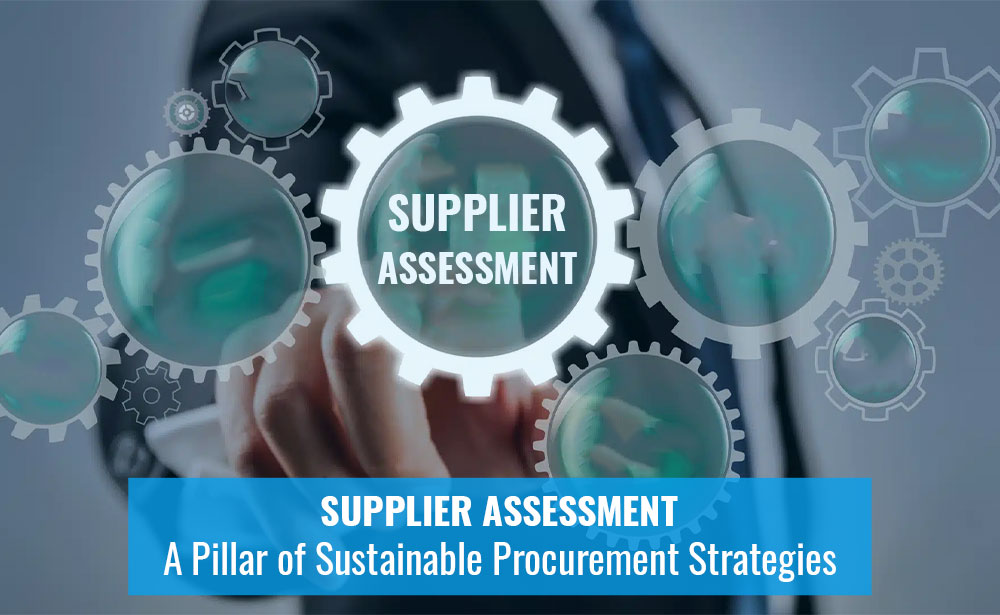In today’s rapidly evolving business landscape, sustainability has emerged as a defining element of corporate responsibility. Sustainable procurement is not just a buzzword but a strategic approach that considers environmental, social, and economic factors in supplier selection and management. At the heart of this approach lies the critical process of supplier assessment. In this comprehensive guide, we will delve into the world of assessment within the context of sustainable procurement strategies. We’ll explore why it’s vital, what it entails, and how to make it a cornerstone of your sustainable sourcing endeavors.
The Essence of Supplier Assessment
Supplier assessment, often used interchangeably with supplier evaluation or appraisal, is the practice of evaluating and rating the performance and capabilities of suppliers. This process is not only about identifying potential weaknesses and strengths but also about fostering improvement. Vendor appraisal can take various forms, from questionnaires and audits to site visits and performance reviews. In sustainable procurement, the focus is on assessing how well suppliers align with environmental, social, and ethical standards and traditional criteria like quality, cost, and reliability.
Sustainable Procurement: Why It Matters
Sustainable procurement goes beyond merely seeking economic value in supplier relationships. It recognizes the interconnection of business activities with environmental and social consequences. Companies are increasingly incorporating sustainable practices into their supply chain processes for the following reasons:
- Reputation and Brand Enhancement: Businesses that demonstrate a commitment to sustainability often gain a competitive edge. Consumers are more likely to favor companies that exhibit environmental and social responsibility.
- Regulatory Compliance: The ever-evolving landscape of regulations and standards necessitates adherence to sustainability principles. Vendor evaluation is a tool for ensuring compliance.
- Risk Mitigation: Sustainable procurement helps identify and mitigate risks associated with environmental and social issues. It’s proactive risk management.
- Cost Savings: By reducing resource consumption, waste, and emissions, companies can realize significant cost savings.
- Ethical Responsibility: Companies have an ethical responsibility to ensure their operations do not harm the environment or exploit communities.
Critical Components of Sustainable Supplier Assessment
Supplier appraisal within sustainable procurement encompasses broader criteria than traditional assessments. Here are the key components:
Environmental Impact Assessment
This involves evaluating a supplier’s environmental practices. It includes:
- Carbon footprint assessment: Understanding a supplier’s contribution to greenhouse gas emissions.
- Resource consumption: Evaluating how efficiently a supplier uses water, energy, and raw materials.
- Waste management: Assessing how a supplier handles waste, including recycling and disposal.
- Environmental certifications: Recognizing suppliers with certifications like ISO 14001.
Social Responsibility Evaluation
Social responsibility extends to labor practices, human rights, and community engagement. This assessment covers:
- Labor conditions: Ensuring fair wages, safe working conditions, and adherence to labor laws.
- Ethical sourcing: Assessing a supplier’s commitment to sourcing materials responsibly, particularly in industries like electronics or fashion, where supply chain labor issues are prevalent.
- Community engagement: Evaluating a supplier’s relationships with local communities and any social initiatives it supports.
Ethical and Legal Compliance
This involves assessing a supplier’s adherence to legal and ethical standards, including anti-corruption, anti-bribery, and data protection laws.
Sustainable Procurement Strategies
- Supplier Collaboration: Collaborate with suppliers to set sustainability goals and regularly review progress.
- Transparency: Demand transparency in your supply chain. This means knowing where materials come from and how they are produced.
- Supplier Development: Provide support and resources to suppliers to help them improve their sustainability practices.
- Product Design: Consider sustainability in the design phase. Sustainable materials and processes can reduce the environmental impact of your products.
- Continuous Improvement: Sustainability is an ongoing process. Continuously assess and improve your suppliers’ sustainability performance.
Leveraging Technology for Sustainable Supplier Assessment
In today’s digital age, technology plays a significant role in facilitating supplier evaluation within the context of sustainable procurement. Supplier management software and digital platforms offer the following advantages:
- Data Analytics: Technology allows for the collection, analysis, and visualization of data related to supplier performance, sustainability metrics, and compliance.
- Automation: Automation streamlines assessment processes, reducing the administrative burden and increasing efficiency.
- Supplier Portals: These online platforms allow suppliers to submit data and documents related to their sustainability efforts, enhancing transparency and communication.
- Integration: Technology can integrate sustainability assessment with other procurement activities, ensuring sustainability considerations are part of the procurement process.
- Real-time Monitoring: Technology enables real-time monitoring of supplier performance and sustainability metrics, allowing immediate action when non-compliance is detected.
Conclusion: Making Supplier Assessment Sustainable
Supplier appraisal has always been crucial for ensuring your supply chain’s quality, reliability, and compliance. However, in the context of sustainable procurement, it takes on an even more significant role. Sustainable supplier appraisal evaluates environmental impact, social responsibility, and ethical compliance. It’s a means of determining how well suppliers align with your sustainability goals and ethical values. As companies increasingly recognize the importance of sustainable practices, supplier evaluation has evolved to meet these new demands.
The ultimate goal is to choose suppliers who can deliver quality products and services and align with your sustainability and social responsibility objectives. It’s about building relationships with suppliers that share your commitment to environmental and ethical practices.
To make supplier appraisal sustainable, companies should adopt a comprehensive approach that includes the following steps:
- Clear Sustainability Criteria: Define your sustainability criteria and expectations for suppliers. Make these criteria an integral part of your supplier agreements and contracts.
- Integration of Sustainability Metrics: Incorporate sustainability metrics into your supplier scorecards. This provides a quantifiable way to measure a supplier’s sustainability performance.
- Continuous Feedback and Improvement: Establish an open channel for communication with your suppliers. Encourage them to provide feedback and ideas for improvement, fostering a collaborative approach to sustainability.
- Auditing and Certification: Consider third-party audits and certifications to validate your suppliers’ sustainability claims. Independent certifications, such as Fair Trade or ISO 14001, can offer an extra layer of assurance.
- Supplier Training: Invest in training and resources for your suppliers to help them improve their sustainability practices. This can include best practices, access to sustainable materials, or technology solutions.
- Real-Time Monitoring: Implement technology-driven real-time monitoring of supplier performance. This allows for immediate corrective action and ensures ongoing compliance with sustainability goals. In conclusion, vendor assessment within the context of
sustainable procurement strategies are not just a checkbox for compliance; it’s a strategic tool to advance sustainability and ethical responsibility. In a world where stakeholders increasingly scrutinize corporate practices, companies prioritizing sustainable supplier appraisal demonstrate their commitment to environmental protection, social responsibility, and ethical standards. As a responsible corporate citizen, your journey toward
sustainability should extend beyond your organization to encompass your entire supply chain. Supplier evaluation is the compass that helps you navigate these complex waters and make sustainable choices. With the proper criteria, technology, and a collaborative approach, you can ensure that your suppliers align with your sustainability vision, fostering a brighter and more responsible future for all.
Key Take Away
By adopting these sustainable procurement strategies and implementing robust assessment processes, your organization can be at the forefront of change in the business world. It’s not just about making better products or services but about a better world.
In a future where sustainability isn’t just a choice but a necessity, your commitment to vendor assessment within sustainable procurement strategies will set you apart. It will drive positive changes in your supply chain and make a meaningful contribution to a sustainable, responsible, and prosperous world.











